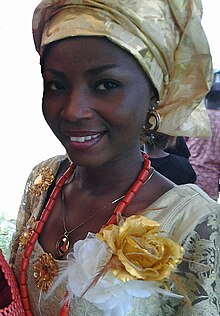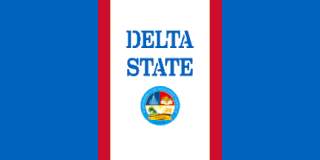
Delta State is a state in the South-South geopolitical zone of Nigeria. Named after the Niger Delta—a large part of which is in the state—the state was formed from the former Bendel State on August 27, 1991. Bordered on the north by Edo State, the east by Anambra and Rivers states, and that south by Bayelsa State while to the west is the Bight of Benin which covers about 160 kilometres of the state's coastline. The state was initially created with 12 local government areas in 1991 which was later extended to 19 and now has 25 local government areas. Asaba as its state capital located along the River Niger on the northeastern end of the state, while the state's economic center is Warri on the southwestern coastline.

The Niger Delta is the delta of the Niger River sitting directly on the Gulf of Guinea on the Atlantic Ocean in Nigeria. It is located within nine coastal southern Nigerian states, which include: all six states from the South South geopolitical zone, one state (Ondo) from South West geopolitical zone and two states from South East geopolitical zone.

The Nun River, also known as Rio Nun, is a river in Bayelsa State, Nigeria. The river is formed when the Niger River splits into two at Toru-Abubou, near Agbere Town in Sagbama Local Government Area of Bayelsa State, forming the Nun and the Forcados rivers.

Bayelsa is a state in the South South region of Nigeria, located in the core of the Niger Delta. Bayelsa State was created in 1996 and was carved out from Rivers State, making it one of the newest states in the federation. The capital, Yenagoa, is susceptible to high risk of annual flooding. It shares a boundary with Rivers State to the east and Delta State to the north across the Niger River for 17 km and the Forçados River for 198 km, with the waters of the Atlantic Ocean dominating its southern borders. It has a total area of 10,773 square kilometres (4,159 sq mi). The state comprises eight local government areas: Ekeremor, Kolokuma/Opokuma, Yenagoa, Nembe, Ogbia, Sagbama, Brass and Southern Ijaw. The state is the smallest in Nigeria by population as of the 2006 census. Being in the Niger Delta, Bayelsa State has a riverine and estuarine setting, with bodies of water within the state preventing the development of significant road infrastructure.
Yenagoa is a Local Government Area and capital city of Bayelsa State, Southern Nigeria. It is located at the Niger-Delta region of the country at coordinates 4°55′29″N6°15′51″E.
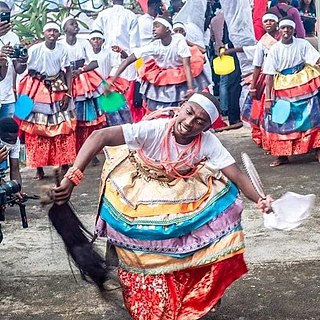
The Itsekiri are one of the Yoruboid subgroup of Nigeria's Niger Delta area, They speak a Yoruboid language and can be found in Delta State. The Itsekiris presently number 300,000 people and live mainly in the Warri South, Warri North and Warri South West local government districts of Delta State on the Atlantic coast of Nigeria.Itsekiris are the minority in Delta State
The Edoid languages are a few dozen languages spoken in Southern Nigeria, predominantly in the former Bendel State. The name Edoid derives from its most widely spoken member, Edo, the language of Benin City, which has 2 million native and secondary speakers.

Isoko South is a local government area (LGA) in the Isoko region of Delta State, Nigeria. With its headquarters at Oleh, Nigeria, it is one of the two local governments that make up the Isoko region. The other is Isoko North, which has its headquarters at Ozoro.
Anioma people are one of the Igbo subgroups in present day Delta State, Nigeria. They encompass the communities which span across the 9 northeastern Local Government Areas of Delta State. They occupy the Delta North Senatorial District, which consists of the Enuani, and Ukwuani/ Ndokwa and Ika geographical and linguistic zones of Delta State.
Isoko is a region of Delta State and Bayelsa state in southern Nigeria and is inhabited by an ethnic group of the same name, the Isoko people. The region is divided into two Local Government Areas, Isoko North and Isoko South.
Isoko is one of the languages in Delta State spoken by the Isoko people in Isoko South, North and part of Ndokwa East Local Government Areas of Delta State, Southern part of Nigeria in Niger Delta region. It is also spoken in some part of Bayelsa. The Isoko language has close similarities between them and Edo people with other Edoid language. The Isoko people are "an ethnic nationality made up of people and their ancestral roots can be traced through history to the Benin (Aka) kingdom, attested to by the linguistic and cultural similarities that exist between the Isoko people and the Benin (Aka)people" although a few of the Isoko communities or clans have their origins attached to the Ibo language and Urhobo language. Some 750,000 people consider themselves Isoko. Language is a mark of identity and plays an all-important role in the life of a people. The Isoko language however, is being threatened with extinction as reported by Idudhe (2002), as a result of neglect in teaching, learning and use. The Isoko language has about 20 to 21 dialects, but the Aviara/Uzere dialect is the standard dialect of the language.
The Kabo tribe of the Izon people lives in the vicinity of Patani in Delta State, Nigeria. The tribe gets its name from its founder, Kabo, and from Kabobolou Creek. Two Kabo towns are located along the creek. Other Kabo settlements include: Patani, Elemebiri (Ofonibeingha), Asamabiri, and Ekperiwari.
The Kolokuma tribe of the Ijaw people live along the Nun River in Bayelsa State, Southern Nigeria. Kolokuma settlements include: Seibokorogha (Sabagreia), Odi, Okoloba, Igbedi and Kaiama. The geographic position of the Kolokuma clan caused them to interact with neighboring peoples including the Mein, Western Tarakiri, Isoko, and Ndokwa Igbo. Also, wars were fought between the Kolokuma and the Boma and Oyakiri tribes in the distant past. Egbesu is the tribal god of the Kolokuma. Historically, the tribe came under the central authority of the high priest of Egbesu. The Kolokuma people speak the Izon language. They are predominantly farmers and fishermen. The freedom just fighter Major Adaka Boro was from the Kolokuma tribe.
Ogbia is a traditional Kingdom and Local Government Area of Bayelsa State in the Niger Delta region of Nigeria. The headquarters of both the Traditional Kingdom and Local Government is located in Ogbia Town at 4°39′00″N6°16′00″E.
The Urhobos are people located in southern Nigeria, near the northwestern Niger Delta.

Masai Michael Ujiri is a British-born Nigerian/Kenyan-Canadian professional basketball executive and former player who is the president of the Toronto Raptors in the National Basketball Association (NBA).
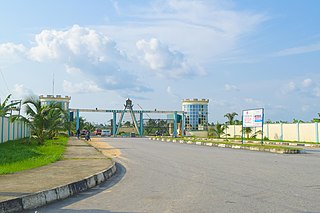
Niger Delta University (NDU) is in Wilberforce Island, Bayelsa State in the southern part of Nigeria. It was established in 2000. It is a Bayelsa state government-funded university. In 2002, It was established by Chief DSP Alamieyeseigha, then governor of Bayelsa state. It has two main campuses, one in the state capital, Yenagoa, which contains the law faculty, and the other in Amassoma. It also has its teaching hospital known as Niger Delta University Teaching Hospital (NDUTH) in Okolobiri.

Esegine Allen, better known by his stage name Orezi, is a Nigerian musician from Delta State. He rose to prominence with his song "Rihanna" in 2013.

Black November: Struggle for the Niger Delta is a 2012 Nigerian-American action drama film starring an ensemble cast that includes Hakeem Kae-Kazim, Mickey Rourke, Kim Basinger, Fred Amata, Sarah Wayne Callies, Nse Ikpe Etim, OC Ukeje, Vivica Fox, Anne Heche, Persia White, Akon, Wyclef Jean and Mbong Amata. It is directed and co-produced by Jeta Amata, and narrates the story of a Niger Delta community's struggle against their government and a multi-national oil corporation to save their environment which is being destroyed by excessive oil drilling.
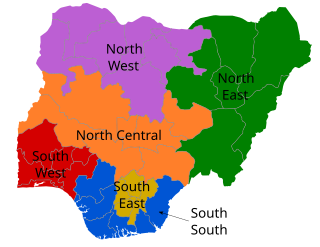
The South South is one of the six geopolitical zones of Nigeria. It designates both a geographic and political region of the country's eastern coast. It comprises six states – Akwa Ibom, Bayelsa, Cross River, Delta, Edo, and Rivers.
